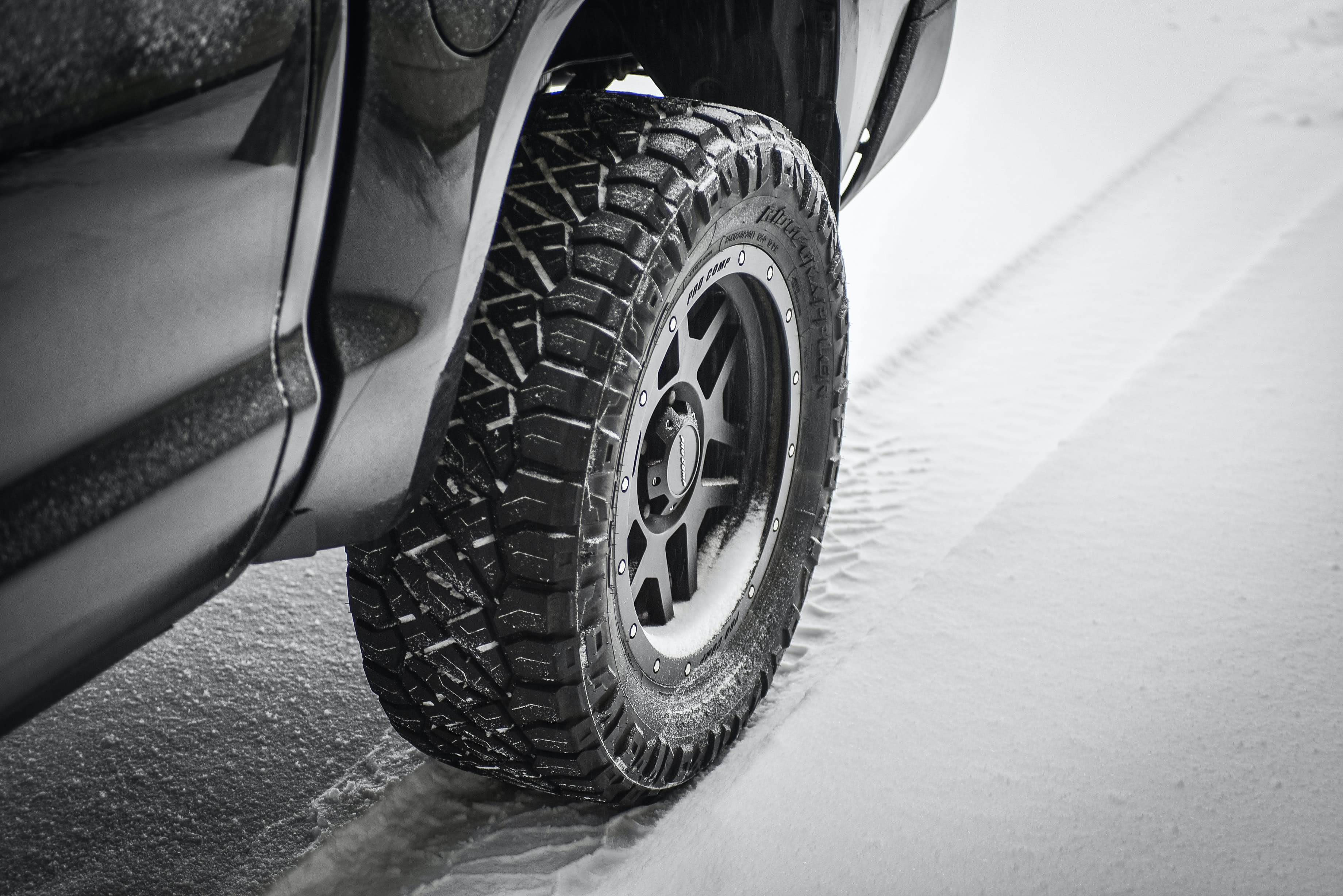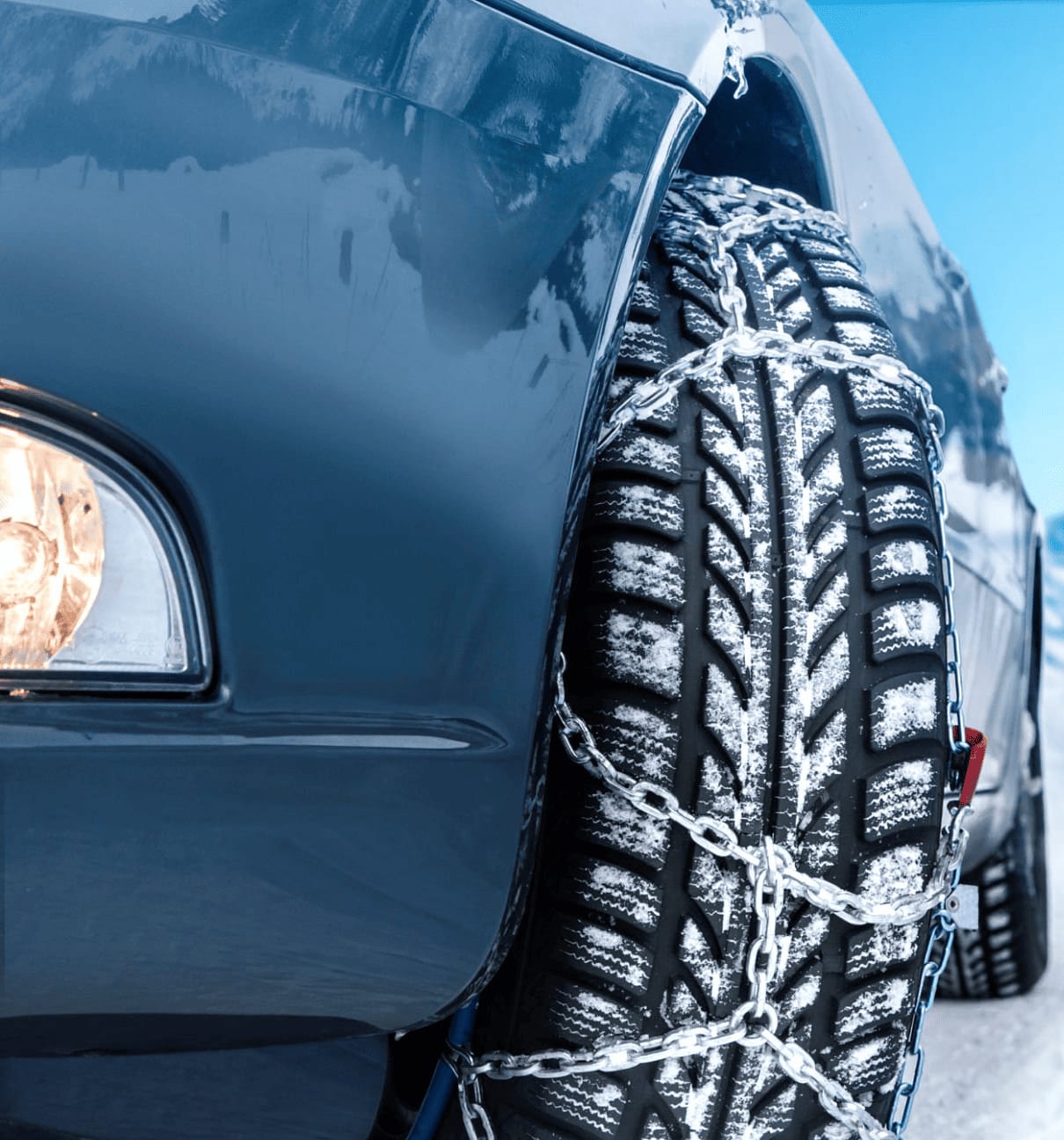Tire Maintenance & Safety
Free shipping
Best price guarantee
SimpleCrew exclusive savings
0% financing options
Tire replacement coverage
24/7 roadside assistance
Easy returns

Winter driving demands preparation and the right equipment to keep you safe on icy roads. Snow tires represent one of the most important safety investments you can make for cold-weather driving.
Many drivers wait too long to install their winter tires, often until after the first snowfall catches them off guard. This delay can lead to dangerous driving conditions and unnecessary risks on slippery roads.
Understanding when to make the switch from all-season or summer tires to snow tires helps ensure your vehicle maintains proper traction throughout the winter months. The timing depends on several factors, including temperature, local weather patterns, and regional regulations.
What are snow tires?
Snow tires — also called winter tires — feature specialized construction that sets them apart from standard all-season or summer tires. These tires use a unique rubber compound that remains flexible when temperatures drop below 45°F (7°C), unlike regular tires that become stiff and lose their grip in cold conditions. The softer rubber allows the tire to conform to road surfaces, maintaining contact even on ice-covered pavement.
The tread design on snow tires incorporates several key features that enhance winter performance:
- Deep grooves and wide channels: These evacuate slush and snow from beneath the tire, preventing buildup that reduces traction
- Aggressive tread patterns: Jagged edges and irregular blocks bite into snow and provide grip on loose surfaces
- Sipes: Thousands of tiny slits across the tread create additional biting edges for ice traction
- Directional patterns: Many snow tires use V-shaped treads that channel water and slush away from the contact patch
Beyond the rubber compound and tread design, snow tires undergo rigorous testing to meet industry standards for winter performance. Manufacturers engineer these tires to deliver shorter braking distances on snow and ice — often reducing stopping distance by 30% or more compared to all-season tires. This enhanced braking capability proves especially critical when navigating steep hills or making emergency stops in winter conditions.
The construction of snow tires also addresses the unique challenges of cold-weather driving. Reinforced sidewalls provide stability when cornering on slippery surfaces, while the overall tire structure maintains flexibility without compromising durability. Some models feature studs or accept metal studs for extreme ice conditions, though many modern studless snow tires deliver excellent performance without the road noise and pavement damage associated with studded options.
How to Know When to Switch to Snow Tires

Choosing the right time to switch to snow tires requires attention to specific factors. One of the most critical elements is the temperature. When the mercury consistently drops below 45°F (7°C), it's a clear indicator to change tires. At these temperatures, the rubber in regular tires stiffens, leading to compromised traction. Snow tires, with their unique rubber compounds, retain their grip, ensuring safe handling on frosty roads.
Regional climate and weather patterns significantly influence this timing. In areas susceptible to unexpected cold spells or early snowfalls, it's wise to fit snow tires sooner rather than later. Keeping an eye on weather updates helps you prepare and avoid being unprepared with the wrong tires. For places with milder winters, you might delay the change slightly, but prioritize your safety first.
It's also vital to understand local regulations regarding winter tires. Some regions enforce laws that require snow tires or chains during certain months. Familiarizing yourself with your state's winter tire laws ensures compliance and helps you avoid fines. These regulations aim to enhance road safety, safeguarding all drivers from the challenges of winter conditions.
Additionally, consider your personal driving requirements. If your routine includes navigating icy roads or steep, snowy inclines, prioritize an early switch to snow tires. Vehicles frequently used for long-distance travel in winter conditions benefit from earlier installation. Assess your vehicle type and typical routes to determine the optimal time for transitioning to snow tires.
1. Check Temperature Thresholds
Temperature plays a pivotal role in determining the effectiveness of your vehicle's tires. When the weather starts to turn cold, the performance of regular tires diminishes. The rubber in these tires becomes less adaptive, losing the ability to maintain a good grip on icy or snowy surfaces. This lack of traction can result in slipping or difficulty stopping on wintry roads.
Snow tires, however, are engineered with a rubber formulation that stays soft even in harsh conditions. This helps the tires maintain superior contact with the road, providing the necessary grip for safe driving. By ensuring your tires match the environmental conditions, you significantly decrease winter driving risks.
Consistently checking local weather trends helps you gauge when to equip your vehicle with snow tires. As forecasts predict colder temperatures, making the switch ensures your vehicle remains reliable and safe on the road. This foresight not only improves safety but also extends the lifespan of your tires, keeping them within their optimal working range.
2. Consider Seasonal Timing
Seasonal timing plays a pivotal role in switching to snow tires. It's crucial to have snow tires installed well ahead of the first significant snowfall to ensure your vehicle maintains traction and stability. This proactive measure aligns with the common advice to change tires around late fall, such as Thanksgiving, when temperatures and weather conditions typically begin to shift.
Aligning your tire changes with the seasons not only enhances safety but also preserves the condition of your tires for future use. By transitioning back to regular tires in early spring, you avoid exposing snow tires to the warmer weather that can accelerate wear. This practice ensures that the tires retain their optimal performance characteristics for when you need them most during the colder months.
Consideration of local climate and weather trends is essential in determining the right time for tire changes. In regions with unpredictable or extended winter conditions, adjusting your timing based on historical weather patterns helps maintain preparedness. Tailoring your approach to fit local conditions ensures your vehicle remains equipped for varying winter challenges, supporting both tire longevity and road safety.
3. Understand Local Regulations

Equipping your vehicle for winter driving involves more than just choosing the right tires—it's crucial to be aware of regional requirements related to winter driving equipment. Many areas implement rules that mandate the use of snow tires or snow chains during certain periods to enhance road safety. These regulations are designed to minimize accidents by ensuring that all vehicles are prepared to handle icy and snowy conditions. Staying informed about these rules not only helps avoid penalties but also contributes to safer roadways for everyone.
To ensure compliance, familiarize yourself with your region's specific mandates regarding winter tires. Some states have precise dates when snow tires must be used, while others may only require them in certain weather conditions or specific zones. Staying updated on these guidelines allows you to plan effectively and avoid any unexpected issues. This proactive approach ensures that your vehicle is always equipped according to local expectations, enhancing your readiness for winter driving.
In addition to regulatory compliance, selecting high-performance winter tires significantly boosts vehicle safety. Premium snow tires offer excellent traction and control, which are vital for navigating hazardous winter roads. These tires are engineered to deliver optimal performance, helping maintain stability and reducing the risk of accidents. By understanding local requirements and investing in quality tires, you ensure your vehicle is prepared to tackle the challenges of winter driving with increased safety and confidence.
4. Evaluate Your Driving Needs
Tailoring your snow tire decisions to your driving needs ensures your vehicle remains safe and efficient during winter months. The conditions you regularly face on the road significantly impact this choice. For drivers who often encounter icy or snow-laden roads, early installation of snow tires is wise. These tires deliver the necessary grip and stability to navigate treacherous conditions, maintaining control and safety at all times.
The type of vehicle you drive also influences the type of snow tires you should consider. Larger vehicles, such as SUVs or trucks, benefit from snow tires designed to support their weight and enhance traction. These vehicles often face more demanding conditions and require tires that can handle the increased load and ensure reliable performance. Selecting the right tire for your vehicle type maximizes handling capabilities and safety on slippery and uneven surfaces.
Driving patterns, like the regularity and length of trips, also play a crucial role in determining snow tire needs. Those with extensive commutes or routes through challenging terrains should invest in tires capable of withstanding harsh winter conditions over long distances. Additionally, staying informed about snow tire maintenance, such as checking for adequate tread depth and proper tire pressure, ensures that your tires perform optimally. By aligning your tire choices with your specific driving needs, you can better prepare for the challenges of winter driving, ensuring a secure and confident journey.
Tips on Maintaining Snow Tires

Proper maintenance of snow tires ensures longevity and optimal performance throughout the winter season. By following a few essential practices, you can keep your tires in excellent condition, ready to tackle the challenges of winter driving.
Regularly Check Tire Pressure
Monitoring tire pressure remains crucial throughout the winter months. Cold weather can cause a natural drop in pressure, which might affect vehicle stability and fuel efficiency. Check your tire pressure regularly using a dependable gauge to ensure it meets the manufacturer's specifications. This practice not only helps protect the tire's lifespan but also supports consistent road grip, enhancing overall safety.
Rotate Tires for Even Wear
Regular tire rotation is essential for maintaining even wear across all tires, which is critical for balanced handling and safety. Uneven tire wear can diminish traction, especially on icy surfaces. Follow your vehicle's service schedule for tire rotations to ensure even tread wear. This routine care helps extend the life of your snow tires and retains their ability to provide reliable grip during winter conditions.
Store Tires Properly When Not in Use
When the season changes, and it's time to switch back to regular tires, proper storage of snow tires becomes vital. Store them in a location that is cool and dry, avoiding exposure to sunlight. Direct sunlight and fluctuating temperatures can deteriorate the rubber, causing premature degradation. Consider using tire bags or covers to shield them from dust and potential damage. By storing your tires correctly, you ensure they remain in optimal condition for the next winter season.
Making the switch to snow tires at the right time protects you and your passengers throughout the winter driving season. By following these guidelines and maintaining your winter tires properly, you'll enjoy safer travels on snow-covered and icy roads. When you're ready to upgrade your winter driving safety, we invite you to shop for tires online and find the best deals with us.
Ready to find the perfect tires?
Search By